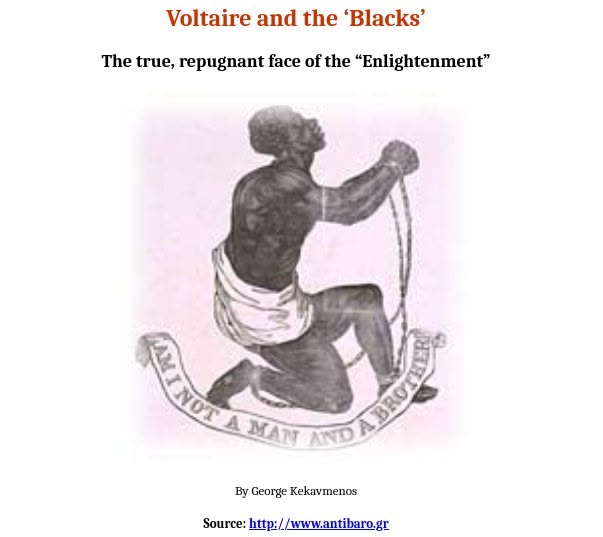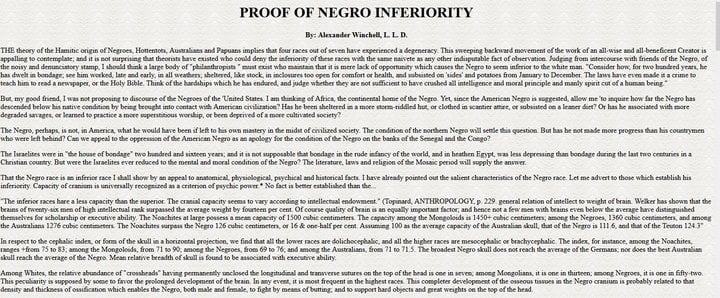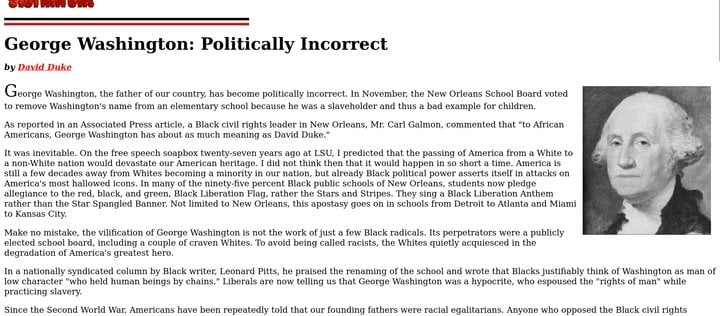Demaris Versus Whites

«Leurs yeux ronds, leur nez épaté, leurs lèvres toujours grosses, leurs oreilles différemment figurées, la laine de leur tête, la mesure même de leur intelligence, mettent entre eux et les autres espèces d’hommes des d i f f é r e n c e s prodigieuses »:
Essai sur les moeurs, INTRODUCTION.[1]
(Their round eyes, their flattened nose, their lips which are always large, their differently shaped ears, the wool of their head, that very measure of their intelligence, place prodigious differences between them and the other species of men.)
«Εt ils n’ont d’homme que la stature du corps, avec la faculté de la parole et de la pensée dans un degré très éloigné du nôtre. Tels sont ceux que j’ai vus et examinés»:
Essai sur les moeurs, INTRODUCTION.[2]
(And they are not men, except in their stature, with the faculty of speech and thought at a degree far distant to ours. Such are the ones that I have seen and examined.)
Since the Second World War, Americans have been repeatedly told that our founding fathers were racial egalitarians. Anyone who opposed the Black civil rights movement were represented as un-American. Of course, it was all a big lie. Washington and Jefferson, as well as the other founding fathers were not hypocrites, they were completely consistent. The truth is that when Washington and Jefferson spoke about the "rights of man" they clearly were speaking about White men, not Blacks whom they viewed as a primitive form of humanity. Thomas Jefferson in his Notes on the State of Virginia wrote that White women who cohabited with Black males should be "outside the protection of the laws," meaning that he believed that those who acted violently against them should not be prosecuted. The Constitution equated Blacks as three-fifths of a person. Even the Supreme Court of the United States dared to state clearly in a major decision that America was created "by and for White people." Racial integration, Black voting, and racial intermarriage were opposed by most Whites until late in this century.
I oppose slavery for the same reasons espoused by General Robert E. Lee. He described slavery as a despoiler of both slave and master. He believed its greatest evil was not perpetrated against Blacks, for he felt that they found a considerable advantage in American rather than African slavery. To Lee, the real damage was being done to White society. Lee was, of course, correct. The importation of millions of Blacks into America has had tragic consequences. Racially aware Whites today oppose the institution just as vehemently as racial egalitarians.
Slavery had a pernicious impact on White people in America, corrupting those classes who owned slaves and harming those Whites who did not. Whites who owned no slaves, almost eighty percent of the South's population, had the value of their labor diminished. Family farmers found it difficult to compete in agricultural markets with the cheap labor provided by slaves on the plantations. Even in many semi-skilled professions, it became difficult for independent White craftsmen to earn a decent wage competing against inexpensive slave labor.
Today, it is easy to see the destructive role of slavery, but those who condemn the founding fathers have no real understanding of history. Slavery was a socially accepted institution for ninety-nine percent of the history of mankind. In many cultures, from the most primitive ones in darkest Africa, to the enlightened ones of Greece and Rome and right up to our own early American republic, families of wealth and prestige often owned slaves.
Even the most loving person who ever walked the earth, Jesus Christ, never uttered a word against slavery, an institution which was prominent all around him. At one point in the scriptures, at the request of a slaveholder, Christ heals his slave. Did Christ instruct him to free the slave? No, he just praised the slaveholder and expressed the wish that all people should have so great a faith. (Luke 7) For his tacitly accepting slavery, will the school board members who attend church also want to extirpate Jesus Christ from their sanctuaries? Will they propose to burn the New Testament because escaped slaves are told to obey their masters and that slaves must be returned to them if they escape.? (1 Peter, 1 Timothy, 2 Titus, Ephesians) The strongest admonishment of the New Testament toward slaveholders is for them simply to treat their slaves kindly.
How does Mr. Pitts reconcile the debasement of George Washington by Black historians while they eulogize African tribal leaders who murdered tens-of-thousands of Blacks, and who without compunction enslaved and sold thousands of Blacks to the slavetraders? According to the new political correctness, White leaders in history who owned slaves are moral lepers, but Black historical figures who did so are "great Black men."
Hollywood characterizes slavery in the American colonies as a suffering unique to the Black race, yet as researcher Michael Hoffman has shown, contrary to modern notions, many thousands of Whites were slaves in the early colonial life. Many more hundreds-of-thousands of Whites faced the slave-like existence of indentured servitude, where under a limited contract, many were worked to death. Their masters often sought to extract every morsel of work from them before their contract expired. One should not forget that slavery permeated the entire world and all continents. In antiquity, slavery was once the terrible price paid by most nations defeated in war. Countless millions of our White ancestors knew the lash of the slavetrader, the pain of the loss of liberty, and the ignominy of a forgotten death. Slavery was certainly not a suffering unique to the Black race.
In North America, slavery was unique only in the fact that it was the kindest expression of it on earth. American Whites treated their Black slaves far better than African Blacks treated their own Black slaves. For this are Whites to be condemned?
On Sunday, November 30 of this year, Sixty Minutes had a program that revealed to a mostly ignorant public, the fact that slavery flourished in Africa long before the White man came and that it continues to this very day. The story depicted an environment of poverty and brutality that would make colonial slavery seem benign in comparison. In Africa today a Black can be born a slave, in America, he cannot.
One illustration of the difference between Whites and Blacks on the question of slavery, is that while historically both Whites and Blacks practiced it, resistance to it has always been led by Whites. In America, Whites composed ninety-five percent of the underground railroad, while in Africa there were no known Black crusaders who rose up with moral indignation against the institution. Africa never had, nor has today, an underground railroad. The observant cannot help but notice that there is no world-wide Black crusade to free their enslaved brethren. Compare that lack of zeal to Black and liberal hysteria against Apartheid South Africa, a society where there was no slavery and the best quality of life for Blacks in all of Africa.
In many of my media appearances with Black leaders, I point out how that if they are to condemn the White race for slavery when only ten percent of the American people practiced it for a period of about two hundred years, how do they feel about their own race which practiced it in Africa from uncounted thousands of years to the present. A black child today in America has far greater chance of having an ancestral slavemaster, than does a white child.
Madison Grant, the great naturalist who had a pivotal role in the conservation efforts of early twentieth century America, grew painfully aware of the need to preserve and nurture the founding stock of our nation. He viewed such as just as vital as preserving its flora and fauna. He said that America "sold its birthright to solve a labor shortage."
While a small class of planters and slavetraders amassed great fortunes, the average Southerner suffered an economic bondage born of slavery. Ultimately, slavery drove the two regions, North and South toward the most terrible of American wars, the War Between the States; the greatest loss of life and property ever sustained by our nation. Not only did it take the grievous toll of a million lost lives, the war cost our people billions of our best genes. They were the genes of genius and honor, of self-sacrifice and bravery, of strength and beauty. Most of the causalities were too young to have passed on those precious traits to the generations ahead. The war erased many thousands of the best of our kind from our gene pool. It incurred a genetic debt that we still pay for today and perhaps will feel forever in our genetic makeup.
I oppose slavery for the same reasons espoused by General Robert E. Lee. He described slavery as a despoiler of both slave and master. He believed its greatest evil was not perpetrated against Blacks, for he felt that they found a considerable advantage in American rather than African slavery. To Lee, the real damage was being done to White society. Lee was, of course, correct. The importation of millions of Blacks into America has had tragic consequences. Racially aware Whites today oppose the institution just as vehemently as racial egalitarians.
Slavery had a pernicious impact on White people in America, corrupting those classes who owned slaves and harming those Whites who did not. Whites who owned no slaves, almost eighty percent of the South's population, had the value of their labor diminished. Family farmers found it difficult to compete in agricultural markets with the cheap labor provided by slaves on the plantations. Even in many semi-skilled professions, it became difficult for independent White craftsmen to earn a decent wage competing against inexpensive slave labor.
Today, it is easy to see the destructive role of slavery, but those who condemn the founding fathers have no real understanding of history. Slavery was a socially accepted institution for ninety-nine percent of the history of mankind. In many cultures, from the most primitive ones in darkest Africa, to the enlightened ones of Greece and Rome and right up to our own early American republic, families of wealth and prestige often owned slaves.
Even the most loving person who ever walked the earth, Jesus Christ, never uttered a word against slavery, an institution which was prominent all around him. At one point in the scriptures, at the request of a slaveholder, Christ heals his slave. Did Christ instruct him to free the slave? No, he just praised the slaveholder and expressed the wish that all people should have so great a faith. (Luke 7) For his tacitly accepting slavery, will the school board members who attend church also want to extirpate Jesus Christ from their sanctuaries? Will they propose to burn the New Testament because escaped slaves are told to obey their masters and that slaves must be returned to them if they escape.? (1 Peter, 1 Timothy, 2 Titus, Ephesians) The strongest admonishment of the New Testament toward slaveholders is for them simply to treat their slaves kindly.
How does Mr. Pitts reconcile the debasement of George Washington by Black historians while they eulogize African tribal leaders who murdered tens-of-thousands of Blacks, and who without compunction enslaved and sold thousands of Blacks to the slavetraders? According to the new political correctness, White leaders in history who owned slaves are moral lepers, but Black historical figures who did so are "great Black men."
Hollywood characterizes slavery in the American colonies as a suffering unique to the Black race, yet as researcher Michael Hoffman has shown, contrary to modern notions, many thousands of Whites were slaves in the early colonial life. Many more hundreds-of-thousands of Whites faced the slave-like existence of indentured servitude, where under a limited contract, many were worked to death. Their masters often sought to extract every morsel of work from them before their contract expired. One should not forget that slavery permeated the entire world and all continents. In antiquity, slavery was once the terrible price paid by most nations defeated in war. Countless millions of our White ancestors knew the lash of the slavetrader, the pain of the loss of liberty, and the ignominy of a forgotten death. Slavery was certainly not a suffering unique to the Black race.
In North America, slavery was unique only in the fact that it was the kindest expression of it on earth. American Whites treated their Black slaves far better than African Blacks treated their own Black slaves. For this are Whites to be condemned?
On Sunday, November 30 of this year, Sixty Minutes had a program that revealed to a mostly ignorant public, the fact that slavery flourished in Africa long before the White man came and that it continues to this very day. The story depicted an environment of poverty and brutality that would make colonial slavery seem benign in comparison. In Africa today a Black can be born a slave, in America, he cannot.
One illustration of the difference between Whites and Blacks on the question of slavery, is that while historically both Whites and Blacks practiced it, resistance to it has always been led by Whites. In America, Whites composed ninety-five percent of the underground railroad, while in Africa there were no known Black crusaders who rose up with moral indignation against the institution. Africa never had, nor has today, an underground railroad. The observant cannot help but notice that there is no world-wide Black crusade to free their enslaved brethren. Compare that lack of zeal to Black and liberal hysteria against Apartheid South Africa, a society where there was no slavery and the best quality of life for Blacks in all of Africa.
In many of my media appearances with Black leaders, I point out how that if they are to condemn the White race for slavery when only ten percent of the American people practiced it for a period of about two hundred years, how do they feel about their own race which practiced it in Africa from uncounted thousands of years to the present. A black child today in America has far greater chance of having an ancestral slavemaster, than does a white child.
Madison Grant, the great naturalist who had a pivotal role in the conservation efforts of early twentieth century America, grew painfully aware of the need to preserve and nurture the founding stock of our nation. He viewed such as just as vital as preserving its flora and fauna. He said that America "sold its birthright to solve a labor shortage."
While a small class of planters and slavetraders amassed great fortunes, the average Southerner suffered an economic bondage born of slavery. Ultimately, slavery drove the two regions, North and South toward the most terrible of American wars, the War Between the States; the greatest loss of life and property ever sustained by our nation. Not only did it take the grievous toll of a million lost lives, the war cost our people billions of our best genes. They were the genes of genius and honor, of self-sacrifice and bravery, of strength and beauty. Most of the causalities were too young to have passed on those precious traits to the generations ahead. The war erased many thousands of the best of our kind from our gene pool. It incurred a genetic debt that we still pay for today and perhaps will feel forever in our genetic makeup.
...




















